Poisoning the well - The toxic ideology behind Cape Town’s water crisis - Part 1
Cape Town is in the midst of a water crisis. This should not be news to anybody living in South Africa, and is indeed world news at the moment, from the USA, to the UK, to Australia.
The politicians and media teamed up to once again give us a very predictable version of events that they saw fit for public consumption, conveniently omitting some glaring realities about their own complicity.
They’ve blamed everything from imaginary man-made climate change, to the people living in Cape Town for using too much water and threatening them with jail time, while also blaming them for not using enough water the same time, stating they “saved water too well”, causing the City to lose revenue, justifying a new water tax which they call a “levy”.
But the cause of this crisis was none of those things. Nor was it really incompetence and bad planning. As we’ll see, they actually planned for this exact crisis more than a decade ago.
No, they actually achieved exactly what they wanted. Because behind this all is a hidden Agenda, and a toxic ideology that goes hand in hand with it. Consequently, while this crisis looks like failure of government to the public, it’s actually success for the promotors of the aforementioned Agenda.
Let’s just get a few things straight:
1) There was advanced warning, as far back as AT LEAST 1990, almost 28 years ago
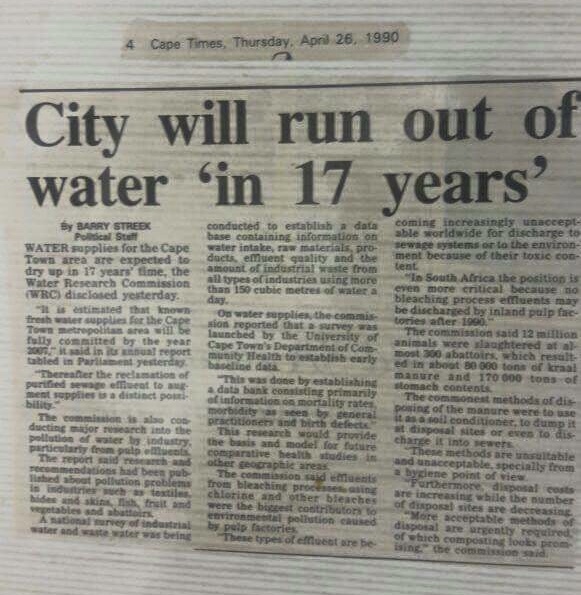
Notice, not one bloody word about “man-made climate change”, because that religion was only born 2 years later. What was done about this warning in the nearly 3 decades since then? One dam was built; the Berg River dam completed in 2009 at a cost of R1.6bn, currently 55% full incidentally.
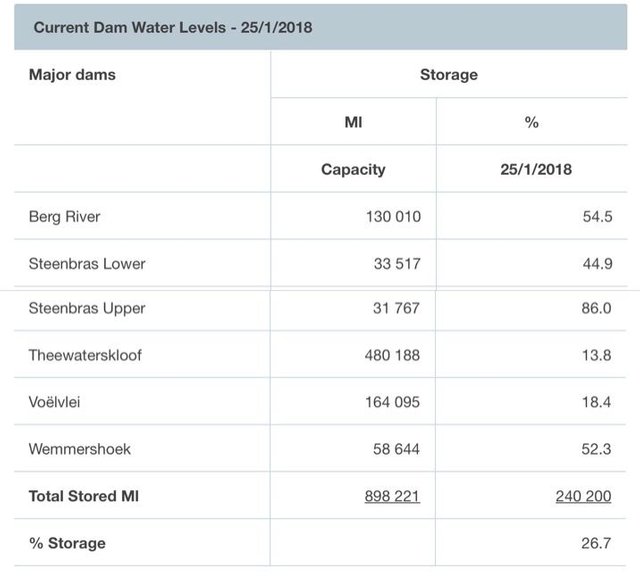
2) Cape Town does still have water even now amidst a serious drought, as can be seen in this facebook video by vlogger Adam Spires, but this water is not being utilized.
While the public is distracted with debates about desalinization plants and their cost and insufficient output, millions of liters of fresh water is flowing into the ocean in Cape Town, every single day.
While desalinization have been considered by the Western Cape government since at least 2007 (and probably even earlier), it really shouldn’t even be a credible argument to alleviate Cape Town’s water problems. It could probably be almost completely solved (probably at a lower cost) simply through treatment and purification of existing fresh water flowing into the ocean, every single day.
3) The extreme measures you see implemented by the City of Cape Town right now, to avoid their dreaded made up “Day Zero”, are not new. They didn’t just come up with these measures now to manage the crisis. No, these measures have been their goals and priority for at least 10 years, probably a bit longer.
4) Another very important point about “Day Zero” - it’s not the day the water runs out. It’s the day the City decides to turn off the taps. Day Zero is whenever they decide it is.
And just to be clear, when I say Day Zero is “made up”, I don’t mean there is no drought, or that wasting water is OK. I simply mean they are purposefully scaring you more than is necessary, because they are busy training you that rationing is the “new normal”, and while I was writing this, they did magically find an extra 60ml (million liters) per day, from the Palmiet rivier, the Elgin/Grabouw area, that is the main feeder for the Steenbras dam. Magic I tell you!
With those few important points out of the way, let’s get to the Agenda and ideology SOLELY responsible for this crisis.
The Agenda
This Agenda has a name - Agenda 21. Promoted to the public under the less sinister sounding name “sustainable development”. For more background on this, see Chapter 1 and Chapter 2 of my series Agenda 21 for Dummies - the aquahelix guide.
One of the core ideologies behind Agenda 21, is the belief that development is inherently bad, and that human impact on the environment should be avoided AT ALL COST. Spoiler: all human activity impacts the environment, including the kind that leads to higher quality of life, and prosperity. It refuses to acknowledge that “impact” and “harm” are not synonyms, and it aims to prevent all impact, not necessarily harm.
The promoters of this Agenda of “sustainable” development, quite wrongly believes that development must somehow be “kept in check” in order to be environmentally sustainable.
This is a totally warped view of reality, and to briefly paraphrase a point Leon Louw from the Free Market Foundation made in a speech in 2002, “Environmentalism and Sustainable Development: a Developing Country Perspective“ - it is not development, but rather a lack of development that is unsustainable. The alternatives to development is stagnation and regression; certainly not sustainable. The more we develop the more sustainable we become.
I also want to make one thing very clear: this is not a partisan issue. All major parties agree - you are not the priority, this Agenda is. The two water management plans referenced below, were from 2007, and 2012. One was under the ANC, the other under the DA. The DA took control of the City after the 2006 municipal elections by coalition, and took control of the province in 2009. The 2007 water plan though, conforms to the council’s “Vision, Goals, and Priorities statement of 2003”, as you’ll see below in Image 3. The province’s plan, is the same as that of the City. The governing parties changed, the plan didn’t. This is a global, one-size-fits-all plan.
The toxic ideology
Agenda 21/Sustainable Development’s ideology, revolves around “demand management”. Something that always translates to, you must pay more (in the form of taxes/levies) for getting less, often through forced rationing. That is the ideology that the City of Cape Town (COCT) has adopted at least since 2007 (and national government since 1998).
That has been their priority, AT LEAST since 2007: not increasing supply, but “managing” your demand, by restricting you with rationing meters and punitive pricing. Totally bullshit economics - the only correct way to “manage” a demand, is to supply it.
The long term plan to implement “demand management”
There are two documents I’d advise you to read if you don’t believe me when I say the city had no interest in increasing your water supply. Nowhere in these documents is serious consideration given to build more dams for instance, and I don’t want to hear this lame excuse that there is no more space in Cape Town to build dams. Much of Gauteng’s water comes from Lesotho, nearly 550km away. We have this wonderful technology called “piping”.
It’s also evident from this post, that they not only decided on the strategy of WDM in 2007, but they they even decided back then what the ration would be you will be allowed: 350/day per household. It had nothing to do with the current drought situation.
The two documents in question, is the COCT Long-Term Water Conservation And Water Demand Management Strategy (April 2007), and the Western Cape Sustainable Water Management Plan (2012)
I will now briefly show you from these above mentioned documents, that:
1) The local government knew at least 10 years ago there will be a water shortage
2) They made it perfectly clear that they don’t intend to increase the supply side of the equation (supply augmentation as they call it)
3) That the entirety of their water management plan revolves around “managing” (read restricting) the demand side, through rationing and punitive measures like levies or price increases
4) That the water demand management strategy is prioritized big time, over increasing your supply of water. Supply augmentation is seen as damaging to the demand management strategy, and that the demand management strategy is more important than you having water.
5) That they see demand management as a useful tool to “delay” spending on infrastructure and supply augmentation that would actually prevent future shortages
6) That the establishment of the “ecological reserve” takes priority over supplying you with water
7) That they even knew, in 2012 already, that 2018 was the target date for water running low.
8) They have no intention of building any more dams, still the cheapest way of all the options mentioned, to effectively augment supply. Once again, don’t tell me there is no space for dams. Most of Gauteng’s water comes from Lesotho, 550km from Johannesburg. There is no reason why a new dam can’t be located in another province even, to serve both provinces, except that their is no will from the political class and their Agenda 21 priests in academia.
Before I speed through some the above mentioned documents with you, you need to understand something to help you identify Agenda 21 programs: Agenda 21 has 3 ‘pillars’ - Economy, Ecology, Equity. Whenever you see those 3 together, you know you’re looking at an Agenda 21 program.
I’m not going to explain every screenshot that is to follow. With the background I’ve given so far, they should be self explanatory, and should highlight exactly how this “demand management” ideology is responsible for continued water shortages in Cape Town.
Let’s dig in, shall we? First the COCT Long-Term Water Conservation And Water Demand Management Strategy (April 2007):
WC/WDM = water conservation/water demand management
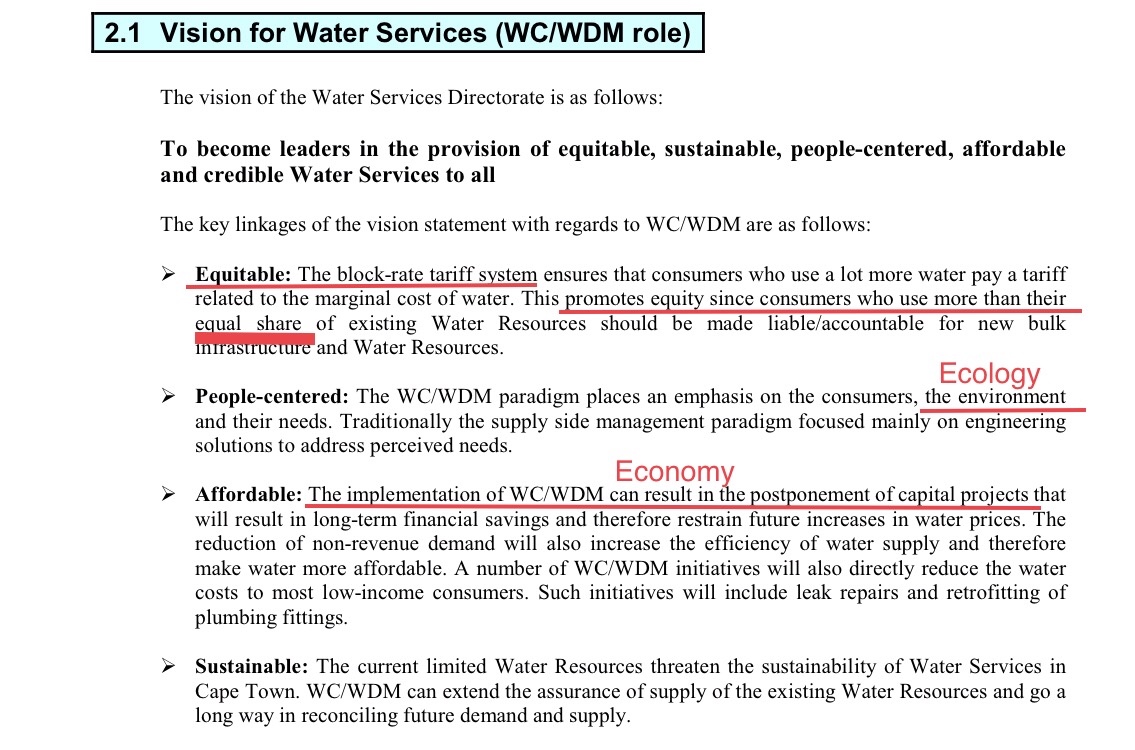
⬆️Image 1 - Above, The 3 pillars of Agenda 21
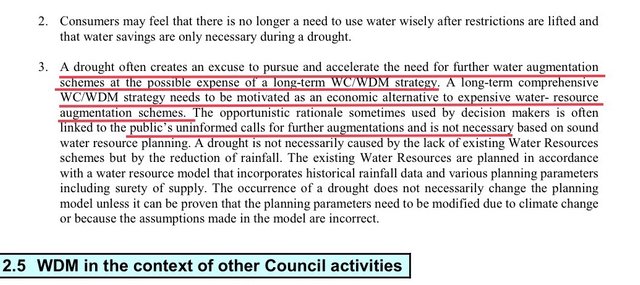
⬆️Image 2 - You are “uninformed” if you want a proper water supply
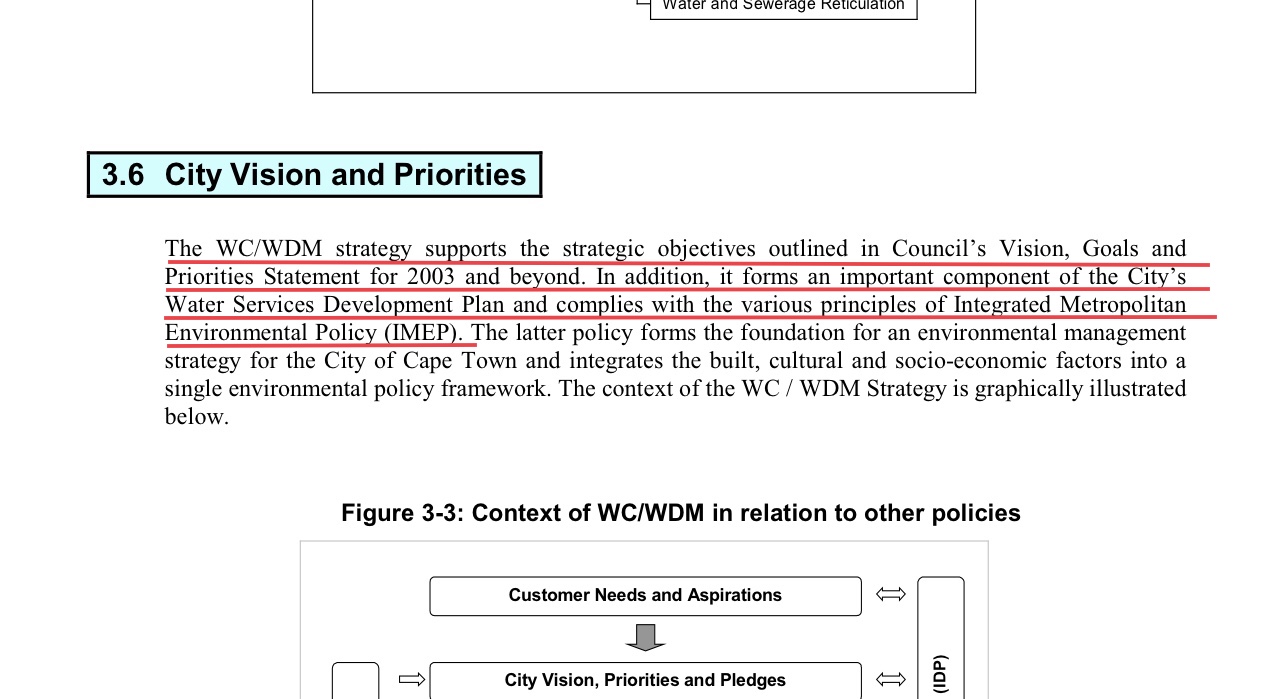
⬆️Image 3 - It is a “vision” and “priority” to manage your demand, not to increase your supply
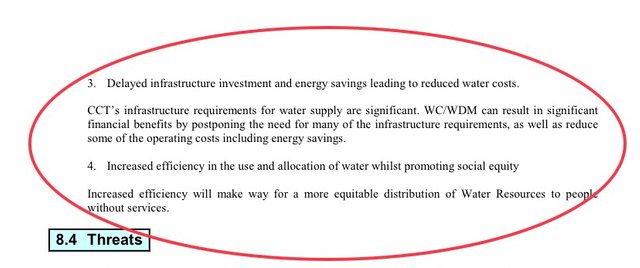
⬆️Image 4 - And more...
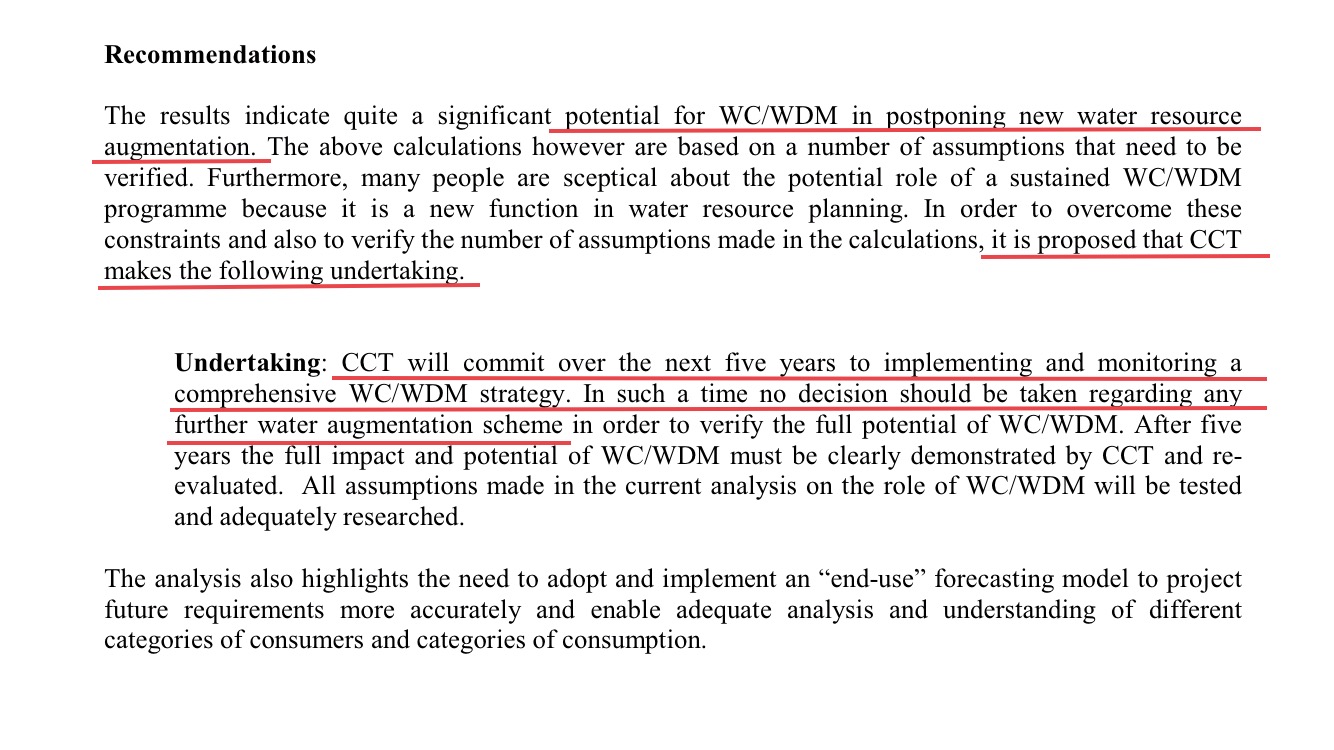
⬆️Image 5 - Postpone what is supposed to be done, by managing demand
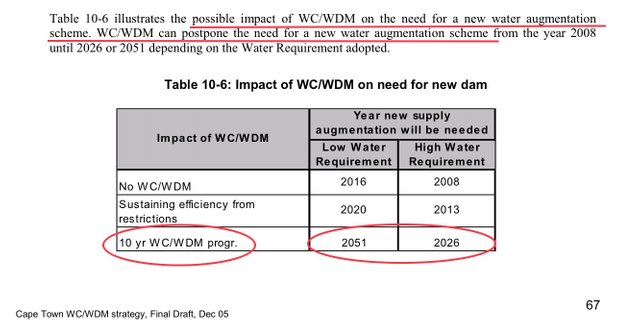
⬆️ Image 6 - Rationing your water can postpone supply augmentation until 2026, or 2051! Peasants!
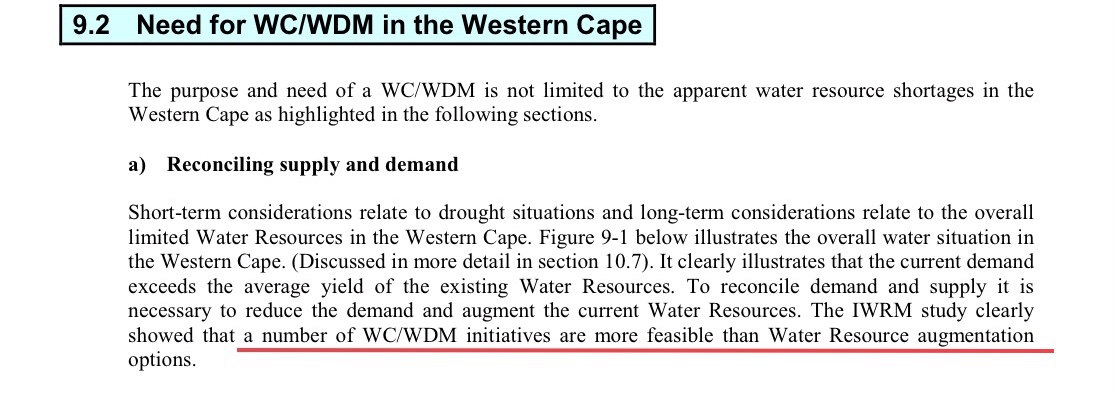
⬆️Image 7 - Demand management more feasible than supply augmentation..
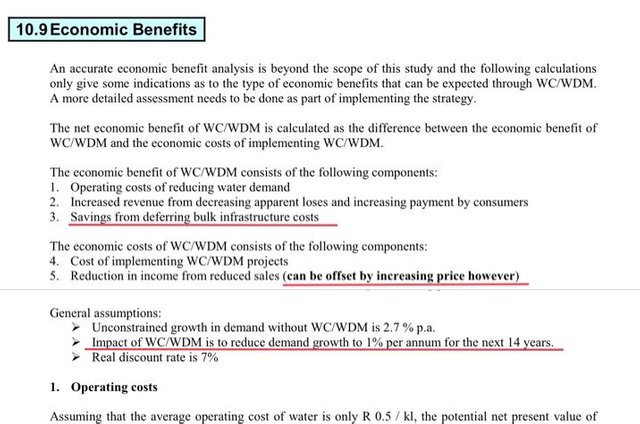
⬆️Image 8 - Reduction in income from lower sales because of WDM, can be offset by increasing price..
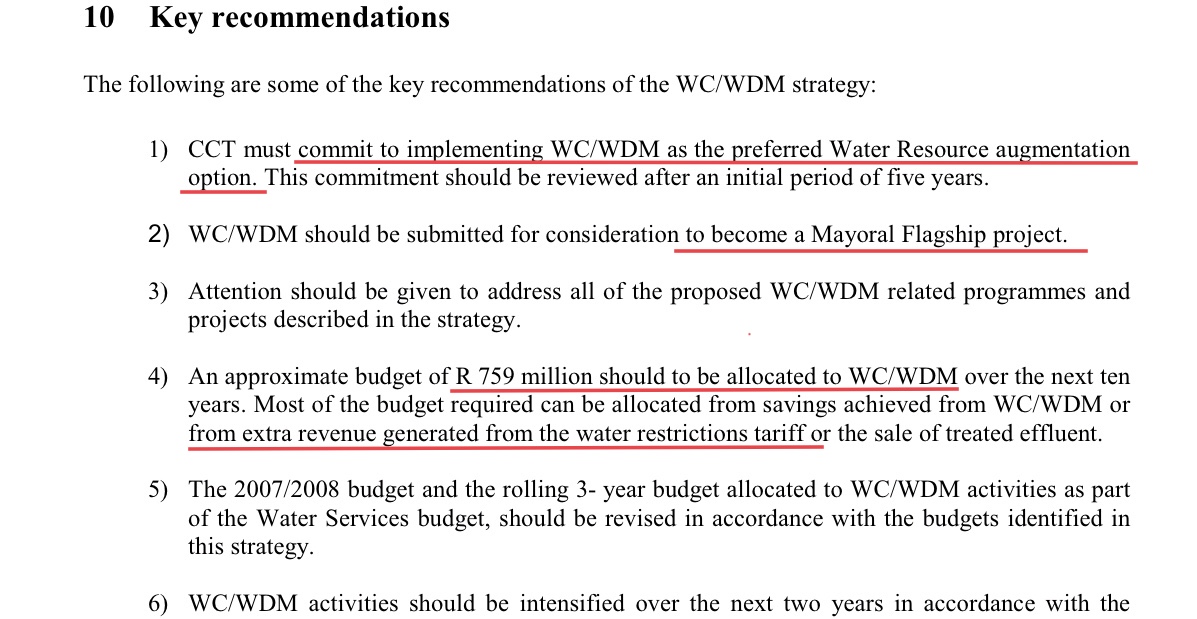
⬆️Image 9 - Revenue generated from water restriction tariffs should be used to restrict you even further.. nice people these..
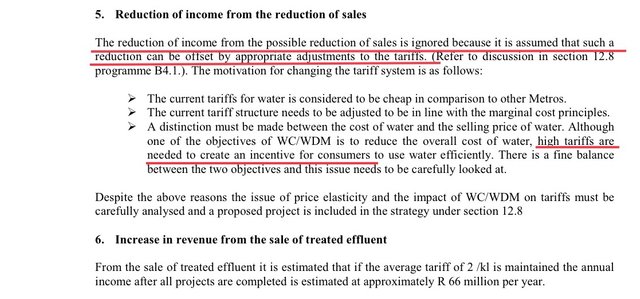
⬆️Image 10 - Reduction in income because of reduced sales are ignored because they can just charge you more.. which, for normal people, would lead to.. even more reduction in sales..
I can go on, but I think you get the idea of the economic cancer contained in this long term water plan.
Let’s move on to the Western Cape Sustainable Water Management Plan (2012):
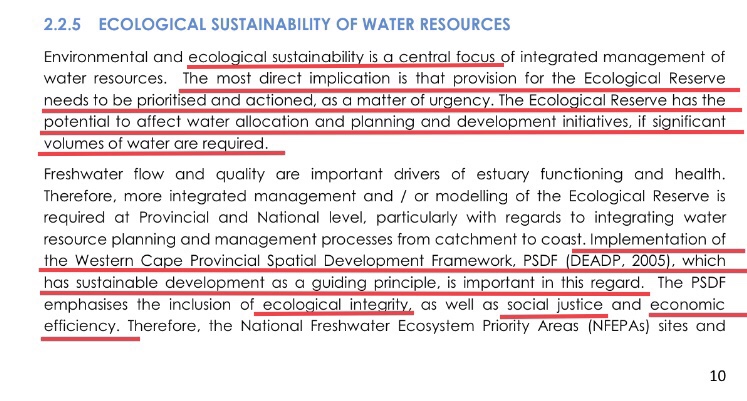
⬆️Image 11 - The “ecological reserve” is a priority over water supply, and the 3 pillars of Agenda 21 making their appearance again..
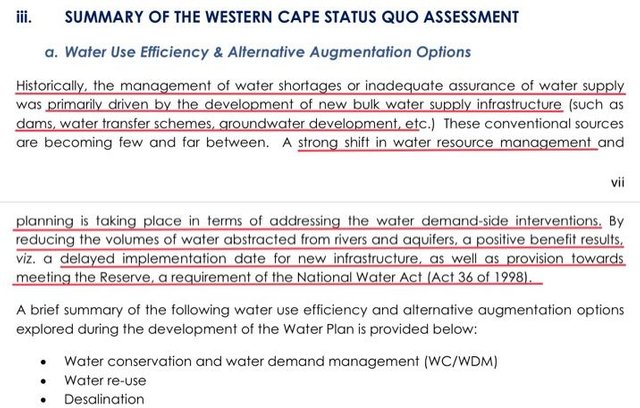
⬆️Image 12 - Managing water shortages or inadequate supply bu developing more bulk supply infrastructure, is outdated..
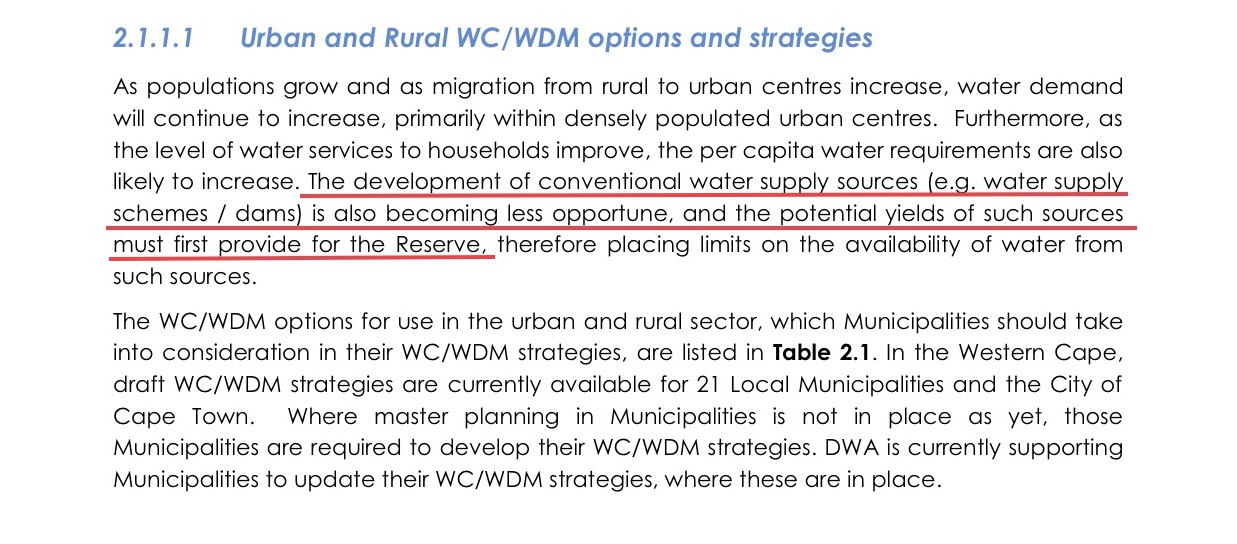
⬆️Image 13 - The ecological reserve is more important than you having water..
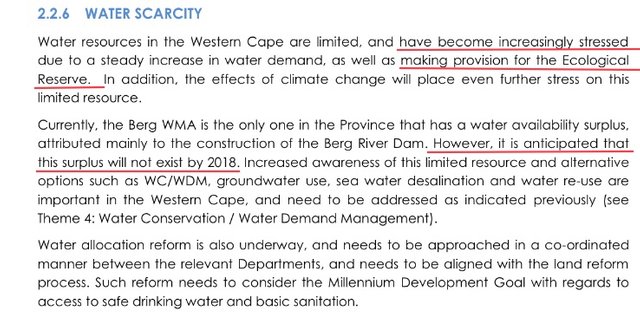
⬆️Image 14 - Advanced knowledge that water would be low by 2018, nothing done to increase supply..
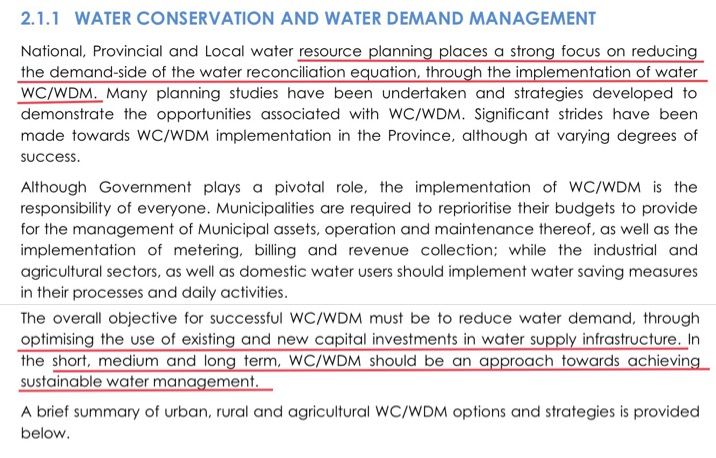
⬆️Image 15 - The only trick in the bag for “sustainable water management”, is demand management. There is literally nothing else
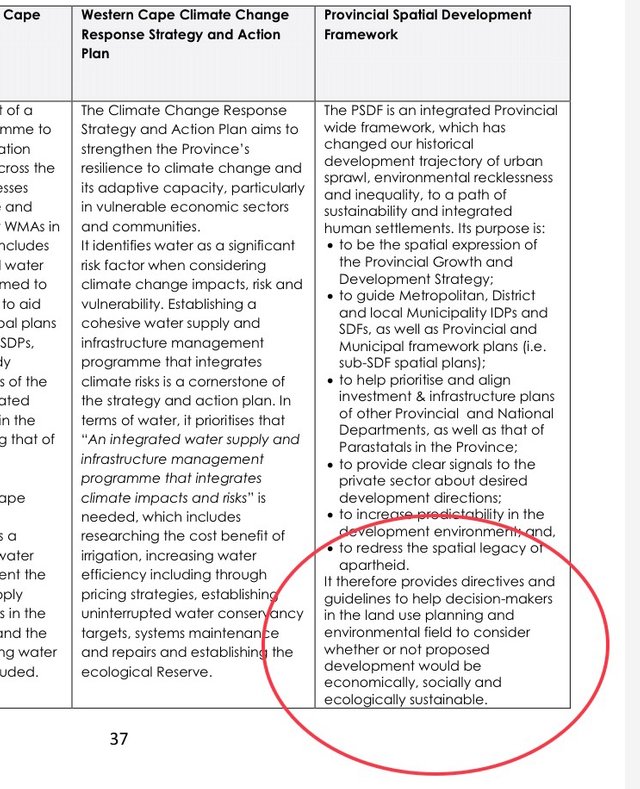
⬆️Image 16 - Lastly, appedix 1, a list of documents referenced to develop this “sustainable water management plan” - Agenda 21’s three pillars making an appearance again.
I hope this makes the point. Your city, and even province, and national government’s approach to water (and other resource) management, is Agenda 21 policy. Demand management is toxic economics. It is destined to produce shortages, and they will use those shortages as an excuse to restrict you even more.
Cape Town is not facing a water shortage merely because of a drought. It faces shortage because its entire planning department has been infected with a cancerous ideology, transmitted through an Agenda 21, ICLEI funded priest-class in academia.
This is what “sustainable development” looks like. Are you enjoying it yet?
Agenda 21 - Feel it, it is here.
@teamsouthafrica
Good summary of the situation. I was unaware that the warnings stretched back to 1990, but I can believe that.
Several NGOs have warned about the coming drought as recently as 2014 and as far back as 2007.
Many people still believe that water supply is the domain of national government. It is not. Water boards must get their agendas checked by national government, and get funding from national government, but they are free to procure funding by other means and ultimately, water supply is the responsibility of municipalities.
4318 views brother. Impressive.
Yeah... if they were Steemians, I’d be rich! 😏